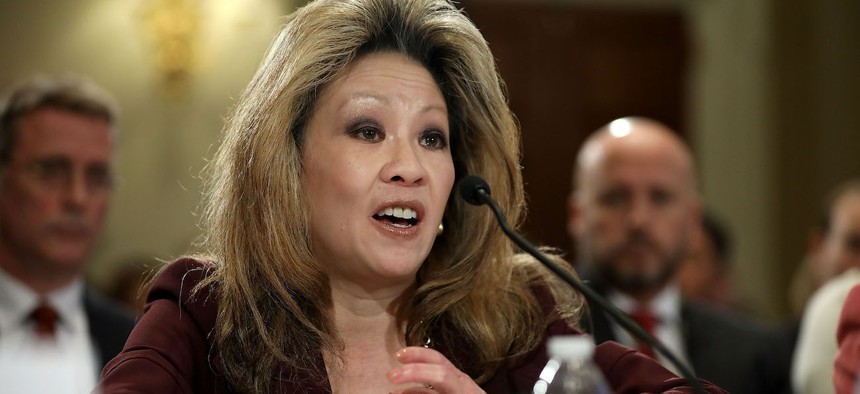
Susan Tsui Grundmann during a hearing on Dec. 7, 2017. The FLRA chairwoman has called for an increase in funding for the agency. Chip Somodevilla/Getty Images
‘There’s no fat left to trim’: FLRA chairwoman warns of possible furloughs in 2024
The agency tasked with overseeing labor-management relations in the federal government had a smaller budget in fiscal 2023 than it did in 2004.
Officials at the federal agency responsible for governing labor-management relations in the federal government warn that unless a decades-long trend of underfunding is reversed, the Federal Labor Relations Authority will need to resort to furloughs to keep the lights on next year.
The FLRA is best known for the three-member board atop the agency that metes out decisions resolving disputes between federal agencies and the unions that represent their employees. But that function is buttressed by a corps of attorneys and investigators investigating complaints and grievances, mediators encouraging settling disagreements throughout the process. And the agency provides training to managers and union representatives alike about the rules of collective bargaining and how to cultivate collaborative relationships.
But the agency’s budget as assigned by Congress has not kept pace with rising workloads, let alone inflation. In fiscal 2023, the FLRA’s appropriations were set at $29.4 million, a 1% decrease from its fiscal 2004 budget of $29.6 million. Conversely, appropriations for the National Labor Relations Board, which serves a similar function albeit for the private sector, have grown 23% over the same time period, while the Merit Systems Protection Board’s budget has grown 51%, and the Equal Employment Opportunity Commission’s has increased 39%.
In the intervening years, the agency’s workforce has fallen from 213 full time equivalent positions in fiscal 2004 to 112 in fiscal 2023. And that’s in the face of surge of recent unionization drives in recent years, as well as a 60% increase in the number of unfair labor practice complaints filed with the agency.
The Biden administration’s fiscal 2024 budget proposal would provide a 14% increase over current funding levels, or a total of $33.7 million. But the Senate’s latest version of appropriations legislation would keep funding flat at $29.4 million, while a House draft bill would cut it further to $28 million.
FLRA Chairwoman Susan Tsui Grundmann told Government Executive Wednesday that even if funding remains steady in the $29 million range in fiscal 2024, that means the agency likely will have to undergo furloughs of anywhere between “a few days” and “20 to 30 days” to balance its books. Those furloughs could create a ripple effect, harming labor-management relations throughout the federal government, she said.
“There’s no fat left to trim . . . Our work is just not going to be completed, it’s going to be delayed,” she said. “That, in essence, will impede work on disputes and how they’re resolved—it’s all kind of related. What we’ve seen before is one dispute going unresolved leads to more disputes and leads to litigation. And if it’s prolonged litigation and disputes, that’s going to decrease employee morale, which is at the heart and core of any function or performance of an agency.”
If the FLRA cannot move expeditiously to resolve disputes or issue decisions, Grundmann said it eventually will serve to undermine the relationships between agency management and union representatives that undergird federal sector collective bargaining.
“If you don’t resolve a conflict, it becomes a dispute, and if a dispute is ongoing for any extended period of time, it may result in litigation,” she said. “If that’s not resolved in a timely fashion, you’ll get more disputes. People will start distrusting each other on both sides, and then eventually get to the point where there’s bitterness. And all of that attention in litigation itself—the resources, the time and the energy—gets diverted from the agency’s performance of a mission. We’ve seen it over and over again.”
Grundmann touted the success of the recently revived Collaboration and Alternative Dispute Resolution Office as a crucial way to try to avert that outcome. Despite consisting of only two attorneys, the office’s success rate in resolving or settling disputes is nearly 100%. However, if funding for the agency remains flat, the office’s impact will ebb.
“CADRO travels [to meet with parties to a dispute], and they can’t do that now,” Grundmann said. “And this travel is to places like Montana and South Dakota—we’re not going to Vegas.”







